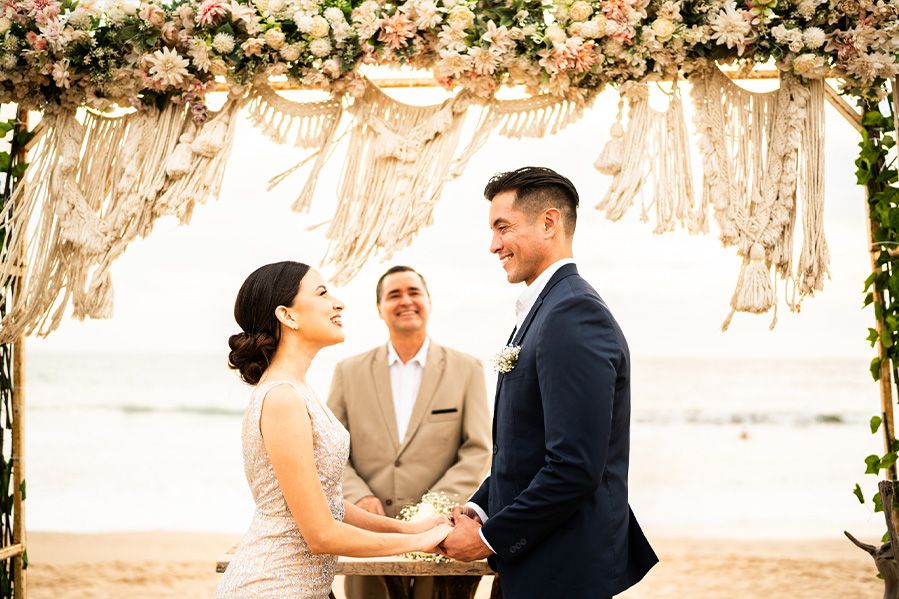
The question of whether you need to be ordained to marry someone is both straightforward and complex, depending on the legal, cultural, and religious contexts involved.
The short answer is yes, in most places, you need to be ordained or otherwise authorized by the state to legally officiate a wedding. However, the pathways to ordination and the specific requirements vary widely depending on the jurisdiction and the nature of the wedding ceremony.
Legal Requirements for Officiating a Wedding
In most countries, including the United States, the legal requirements for officiating a wedding are set by local governments, often at the state or provincial level.
These laws dictate who has the authority to solemnize a marriage, which typically includes:
Ordained Ministers or Religious Leaders: Traditionally, religious leaders such as priests, rabbis, imams, or other clergy members who have been ordained by their respective religious institutions are authorized to officiate weddings. Their ordination provides them with the legal authority to solemnize marriages within the jurisdiction where they are registered.
Judges or Justices of the Peace: In many jurisdictions, civil officials like judges, justices of the peace, magistrates, or other court officials can also legally officiate weddings. These individuals are not ordained but are granted the authority to perform marriages by virtue of their public office.
Civil Celebrants: Some places allow civil celebrants, who may not be ordained or religiously affiliated, to officiate weddings. These individuals are often required to undergo specific training or certification to ensure they understand the legalities of marriage and can conduct the ceremony in accordance with the law.
Online Ordination: In recent years, online ordination has become a popular way for individuals to gain the authority to officiate weddings, especially for friends or family members. Organizations like the Universal Life Church (ULC) offer online ordination services, often with
minimal requirements. Once ordained, these individuals are legally recognized as ministers in every state except for Virginia and can officiate weddings.
The Process of Becoming Ordained
If you want to officiate a wedding, becoming ordained is often the most straightforward path. The process varies depending on the method of ordination you choose:
Traditional Religious Ordination: For those affiliated with a religious denomination, ordination typically involves a formal process that may include religious education, training, and a ceremonial rite. This is common in established religious traditions such as Christianity, Judaism,
and Islam. For example, in Christian denominations, candidates for ordination often attend seminary and undergo a rigorous process before being recognized as ministers.
Online Ordination: For those not affiliated with a religious institution, online ordination is a popular alternative. The process is usually simple: if you feel so-called, you fill out a form, pay a fee (if required), and receive your ordination certificate, often within minutes. This certificate can then be used to register with local authorities where required. Online ordination is particularly appealing for those who wish to officiate weddings for friends or family members without pursuing a lengthy or denominationally affiliated path to ordination.
Legal Recognition of Online Ordination
The legal recognition of online ordination varies by jurisdiction. In the United States, for example, each state has its own laws governing who can officiate a wedding. While many states recognize online ordination as valid, others are more restrictive. For instance:
States that Recognize Online Ordination: Most states, including California, Texas, and New York, recognize online ordination and allow ministers ordained through online organizations to officiate weddings. In these states, the process is usually straightforward—once ordained, you can legally perform weddings.
States with Restrictions: The state of Virginia does have some restrictive laws that could prohibit ministers who were ordained online from performing certain functions.
Local Variations: Even within states that recognize online ordination, there may be local variations. Some counties or municipalities may have additional registration requirements for officiants, such as filing an ordination certificate or obtaining a license to perform marriages.
It’s crucial for anyone planning to officiate a wedding to research the specific legal requirements in the jurisdiction where the wedding will take place. Failure to comply with local laws can result in the marriage being deemed invalid.
Religious and Cultural Considerations
Beyond the legal requirements, religious and cultural considerations also play a significant role in determining who can officiate a wedding. Different religious traditions have varying rules about who is authorized to conduct marriage ceremonies:
Christianity: In many Christian denominations, only ordained clergy members can officiate weddings. This includes pastors, priests, and ministers who have undergone formal religious training and ordination. However, some denominations are more flexible, allowing laypeople to officiate under certain circumstances, especially in non-traditional or informal settings.
Judaism: In Judaism, rabbis typically officiate weddings, though cantors and, in some cases, knowledgeable laypeople may also conduct the ceremony. The requirements can vary depending on the denomination (Orthodox, Conservative, Reform, etc.), with some requiring more formal ordination than others.
Islam: In Islam, marriage is a contract, and the officiant is often an imam or a respected community leader with knowledge of Islamic law. However, there is flexibility within the tradition, and in some cases, any knowledgeable and trustworthy Muslim can officiate the marriage,
provided they fulfill the necessary requirements.
Secular and Interfaith Weddings: For secular or interfaith weddings, the officiant may not need to adhere to any particular religious tradition. In these cases, the couple may choose a celebrant or officiant who is legally authorized to perform weddings but is not bound by
denominational constraints. This is common among couples who do not follow a specific religion.
How to Choose an Officiant
Choosing an officiant is a significant decision for couples, as the officiant sets the tone for the ceremony and plays a key role in one of the most important moments of their lives. Here are some factors to consider:
Relationship with the Couple: Many couples choose someone they know and trust to officiate their wedding, such as a friend, family member, or mentor. This personal connection can make the ceremony more meaningful and intimate.
Religious or Cultural Alignment: For couples with strong religious or cultural ties, it’s important to choose an officiant who shares their beliefs and understands the significance of the rituals involved. This ensures that the ceremony is conducted in a way that respects and honors their traditions.
 Legal Authorization: Ensuring that the officiant is legally authorized to perform weddings in the jurisdiction where the ceremony will take place is crucial. This may involve checking the local laws, ensuring the officiant is properly ordained, and completing any necessary registration or paperwork.
Legal Authorization: Ensuring that the officiant is legally authorized to perform weddings in the jurisdiction where the ceremony will take place is crucial. This may involve checking the local laws, ensuring the officiant is properly ordained, and completing any necessary registration or paperwork.
Ceremony Style: Different officiants have different styles, ranging from formal and traditional to relaxed and personalized. Couples should choose an officiant whose style matches their vision for the ceremony. Some officiants may also be willing to work with the couple to create a customized ceremony that reflects their values and personalities.
Experience and Comfort Level: An experienced officiant can help guide the couple through the ceremony with confidence and ease. However, even a first-time officiant can be successful if they are well-prepared and comfortable speaking in front of an audience.
The Role of the Officiant in the Wedding Ceremony
The officiant’s role goes beyond simply pronouncing the couple married. They are responsible for setting the tone, guiding the couple through their vows, and ensuring the ceremony proceeds smoothly. Key responsibilities include:
Pre-Ceremony Meetings: Meeting with the couple before the wedding to discuss their expectations, preferences, and any specific requirements for the ceremony. This helps the officiant understand the couple’s vision and create a ceremony that reflects their wishes.
Script Preparation: Writing or reviewing the wedding ceremony script, including the vows, readings, and any other elements the couple wants to include. The officiant should ensure that the script is personalized and meaningful.
Rehearsal: Leading the wedding rehearsal, if applicable, to ensure everyone knows their roles and the ceremony proceeds without a hitch. This is particularly important for larger or more formal weddings.
Ceremony Leadership: On the wedding day, the officiant leads the ceremony, guiding the couple and guests through the proceedings. This includes welcoming the guests, delivering any opening remarks, guiding the couple through their vows, and pronouncing them married.
Legal Paperwork: After the ceremony, the officiant is responsible for ensuring that the marriage license is signed by the couple and witnesses, and then submitting it to the appropriate government office for registration. This is a critical step in making the marriage legally binding.
In most jurisdictions, you do need to be ordained or otherwise authorized to legally marry someone. While traditional religious ordination remains a common pathway, online ordination has opened the door for friends, family members, and others to officiate weddings with ease.
The legal requirements vary widely, so it’s essential to understand the laws in the specific location where the wedding will take place. Beyond the legalities, the choice of officiant should reflect the couple’s values, beliefs, and relationship, ensuring that their wedding ceremony is as meaningful and personal as possible.
Add Your Comment